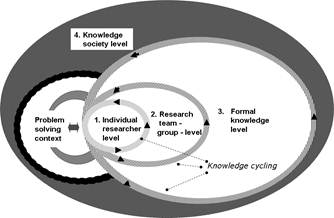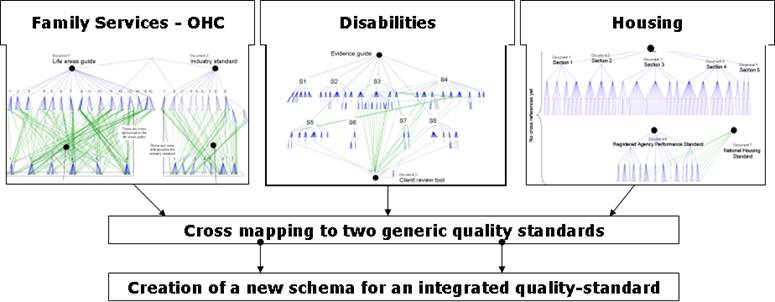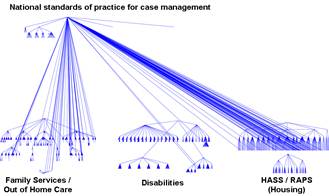Hi Rich,
You said:
1. Lets use the scientific discovery process as a model, and try to limit the number of distinctions to no more than three
2. Perhaps instead we should consider that limited class I suggested, and try to make progress elaborating Doug’s formulation by experiment, observation or classification, but in a more focused manner.
I am not sure if one can explore the notion of an ontology of self-interest (perhaps even self-interest as well) in this way. To draw this matter out …..
In any given context, there are multiple levels of hierarchy involved –for example see below.

Figure 6 The hierarchical levels of knowledge cycling in a research enterprise (source here) from this book.
You also said:
In the problem statement of any patent, we should be able to tease out the interest being served, which is the subject of our present discussions.
The language has subtly shifted here from “self-interest” to “interest”. This represents a shift in the language even if the context is about patents. This shift also relates to the challenges of hierarchy as well. For example ,a research scientists “self-interest” is quite different to a knowledge society’s “interest” [and these represent different levels of hierarchy].
Thus, I find myself asking a question: can a notion of “self-interest” or “interest” be represented as an ontology?
My sense is that there is utility in understanding these types of matters as evolutionary processes that cross over between ontology and epistemology. And that this in part involves processes of attempting to resolve incommensurability.
John Sowa says: If Richard or anybody else wants to use the term 'incommensurable'
they should say what they are comparing, how they are doing the comparisons, and what kinds of difficulties they have found.
In the text of the book chapter related to the diagram above, distinctions are made between the tacit, implicit and explicit schemas used by researchers involved in the “scientific discovery process” with the schemas both adopted by the research team, and the research organisation, as well as the more formal schemas (negotiated standards) set by organisations such as national libraries or other national and international standards bodies.
To respond to John’s suggestion about what context I should use of the word “incommensurable”, two examples of how comparisons are undertaken and the sorts of difficulties that arise are:
(a) Creating commensurability between different quality standards published as print documents. This challenge is manifest in the figure below where three different quality standards are logically and semantically structured in completely different ways as follows. The problem is that one organisation can be delivering all these services. This in a nut shell is the madness of regulatory burden with uncoordinated schemas across multiple service systems. See report details here: Sections 3.2 and 3.3.
To resolve these problems of what I call incommensurability, an additional level of hierarchy needs to be introduced to support semantic and syntax mapping to allow for the emergence of a negotiated new schema.

(a) Creating commensurability between different understanding of case management across different service systems. See report details here: See section 4.3
Here the problem is to do with the use of different (explicit, tacit and implicit) social languages of case management in each of the different service systems. Once again a different level of hierarchy is introduced to help mediate the differences.

Figure 15. Cross-map using the terms ‘case management, ‘case’, ‘management (case)’
My question is whether these types of evolutionary systems be contained within a notion of an ontology of self-interest?
Is it in fact a generalised ontology of self-interest that we are discussing? Or by suggesting that we can only have a meaningful conversation about this topic by focusing on a particular level of context (i.e. patent type context) are you implicitly conceding that an ontology of self-interest is difficult to generalise about?
In which case are you suggesting we cannot work from the “general” to the “particular” when it comes to the topic of an ontology of self-interest?
If you are, I would be included to agree with you.
Cheers,
Richard


